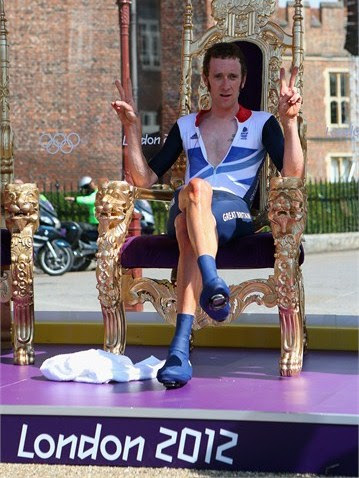There was a noticeable slackening in media angst on Day Five of the Games as Team GB delivered a total of five medals including Gold twice. The first was awarded to Olympic Rowers Helen Glover and Heather Stanning in the women’s pairs. This was the first time Britain had ever won a ladies’ rowing gold, an achievement made all the more remarkable by Helen Glover having never even sat in a rowboat until 2008.
On any other day, their win would have hogged the headlines, but this was no ordinary day. This was the day that hundreds of thousands of people poured onto the streets of Surrey, many of them sporting stick-on sideburns, to celebrate the latest national craze – Wiggomania.
Hampton Court has witnessed coronations over hundreds of years, but never one quite like that accorded to Bradley Wiggins yesterday. Britain loves its heroes, especially when they are somewhat understated, so we were probably slightly in denial when Bradley’s triumphant homecoming after capturing the pride of France ten days ago was put on hold for a few days through the imminent commencement of the Olympics, and his highly-anticipated starring role. Again, there was a typically-English further postponement due to Johnny-Foreigner’s lack of co-operation in the Road Race on Saturday. But once the responsibility for delivering the goods was placed solely on those individual shoulders, there was no hiding place for inevitability.
Bradley Wiggins ticked all of the iconic boxes during a fifty-minute pedal in the sunshine, which is what he made it seem, although it was nothing of the sort. One man against adversity, the lone hero against the sands of time. Yes, there were other ‘chaps’ on the same road, but they were supporting actors for a leading role that was destined to win the Oscar. There was his faithful batman, Chris Froome, who had shepherded his commanding officer across France to bring him home in triumph. A fitting ending would have been for Chris to stand to Bradley’s right in the ceremony as runner-up, just as he had on the Champs Elysee, but that wasn’t to be. Instead he would stand to Bradley’s left, clutching an award made of Bronze, the substance of cannon barrels and heroic statues.
That was also fitting, for it would not have been right for so faithful a comrade to be so visibly vanquished. Instead, that dubious honour was, of course, bestowed upon a German – a German not simply beaten by a hairs-breadth in one last slow-motion lunge for the line, but by a margin of victory that wasn’t measured in hundredths of a second, not even single figures of seconds. Forty-two seconds was a margin so huge that if the race had been staged in the Olympic Stadium, the entire field would have been lapped at least once. And it showed, as the runner-up tumbled exhausted from his bike whilst entering victory lane, laying prostrate for several minutes as he came to terms with what had happened, until our victor stood over him, barely out of breath as he extended the hand of consolation. If this were Hollywood, and who knows one day it might be, the final line would have to be: “We must do this again sometime, old boy.”
And the crowds just loved it. They cheered Wiggo as he waved to them once he had his position confirmed, they cheered him as he rode to the winners circle, then back again to the finishing line to find his parents, then further as he returned to the winners’ circle to find the rest of his family. They cheered him as he queued for the medal ceremony, as he received his medal, as he posed for the photographers. They were still cheering him six hours later when he sat in the glass-walled BBC Studio high-up at the Olympic Park waiting to be interviewed. “Go on,” Gary Lineker urged, “show ‘em your medal.”
As Bradley Wiggins stood to face the thousands below looking up at the studio, he raised his medal for them to see. They all cheered him wildly. He was clearly moved by the accolade as he whispered: “Now I know how the Beatles felt.”

